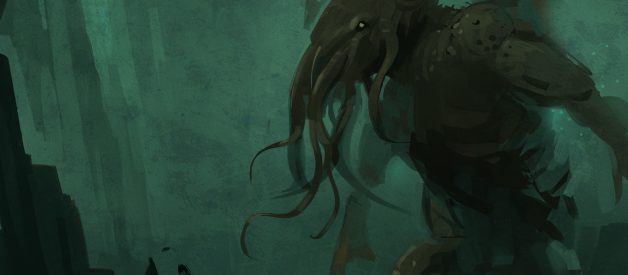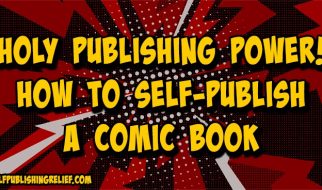In the summer of 1926, a then little-known writer, Howard Phillips Lovecraft, was writing what would become his most well-known work, The Call of Cthulhu. This story would be published in Weird Tales in 1928 and would go on to have an immense cultural impact ? one that is still growing today.
It would inspire countless short stories, novels, video games, films, songs, and more, all created by writers and artists taking the core Cthulhu themes, and putting their own twist into the canon of Mythos. The various iterations and spins on Cthulhu have resulted in everything from deeply disturbing renditions of the Great Old One as a dark, alien destroyer, to being rendered as a cute plushie toy! Perhaps plushie-hood was inevitable once Cthulhu and its ilk became a meme replicated millions of times in many languages.
Lovecraft himself would never know the success and cultural impact this or any of his other works would have. When he died in 1937 he would only know that his works had reached a limited audience, never having made enough from his works to make a living as a writer.
Yet over 90 years since he set out the plot of The Call of Cthulhu, the idea, themes, and the eponymous creature has finally reached the mainstream. The majority of us have heard of ?The Call of Cthulhu? in one form or another.
I speak as a convert to this call. When I was young I discovered the Mythos and have been reading, writing, and creating works ?inspired by? it ever since! Right now I?m one of the team working on an adaptation of the hit roleplaying game Achtung! Cthulhu.
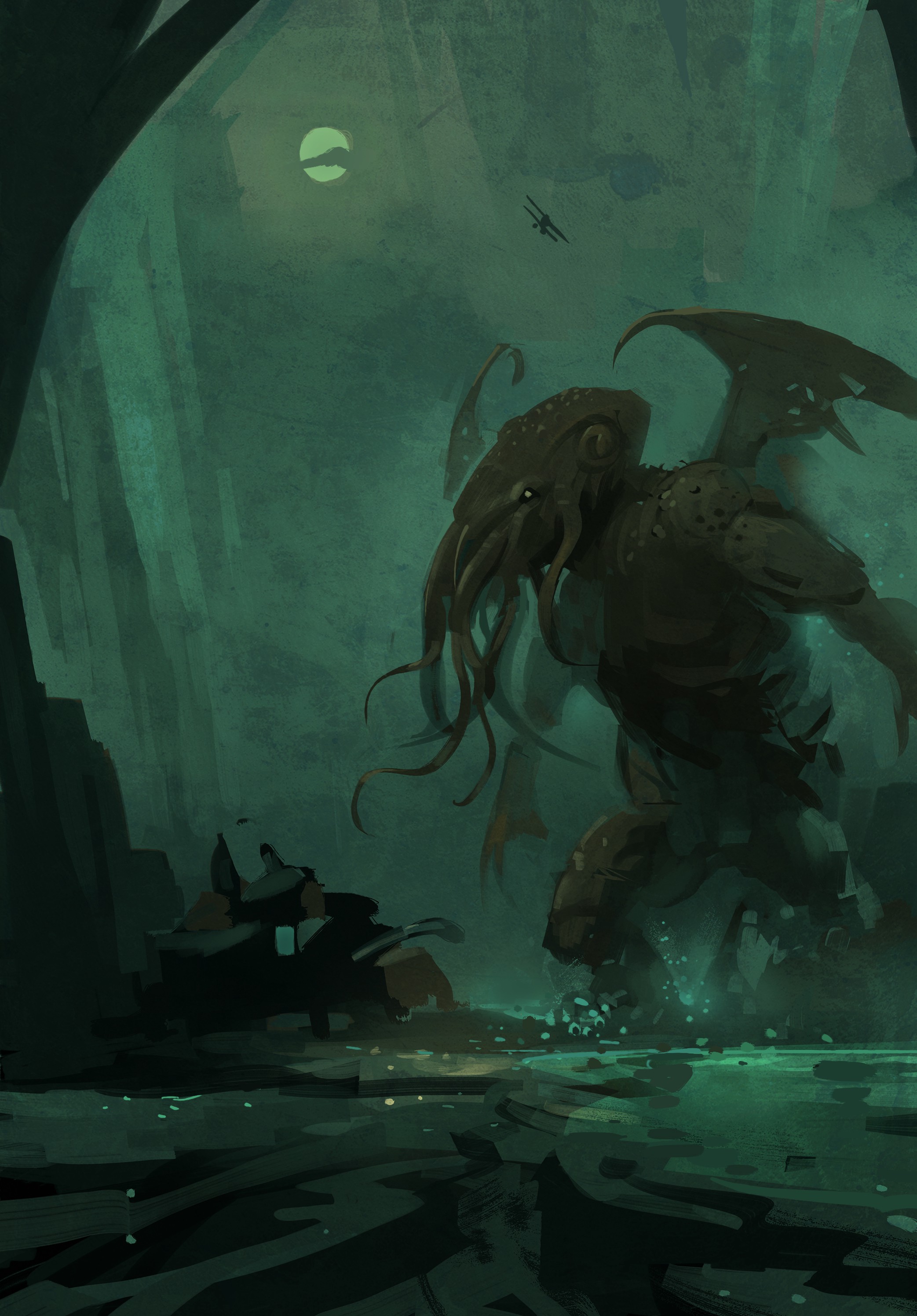 Cthulhu by Dim Martin
Cthulhu by Dim Martin
Cthul-what? What Are the Cthulhu Mythos?
For those unfamiliar with the Cthulhu Mythos, the titular Cthulhu is a titanic alien being who slumbers in the inhuman sunken city of R?lyeh which lies in the South Pacific. Once, many aeons ago, Cthulhu and other beings like him ruled the earth. Such is Cthulhu?s power, that even asleep he is able to influence the dreams of humans and has created a fragmented but global cult of worshippers who consider him a god. Both deity and disciples await the time he?ll wake, breakout of his watery prison, and retake his rightful place as the planet?s ruler.
If upon reading this article, you?re somewhat struggling to pronounce ?Cthulhu?, then you?re not alone, and that was kind of Lovecraft?s point with the name ? it?s meant to sound inhuman, and we struggle to pronounce it using our puny human voice boxes.
Lovecraft wrote a bunch of stories set within the same universe as Cthulhu, using common themes, characters, and objects, such as the fictional book ?The Necronomicon? which documents much of this terrible ?reality?. Other authors joined in with this world building, adding dark gods, strange races of creatures, myth cycles, lost artifacts, more forbidden tomes, and so on until together they?d created a vast and rich narrative universe which has become known as the ?Cthulhu Mythos?. Since Lovecraft?s death in 1937 other authors have taken up the mantle and the Mythos has expanded in many new directions.
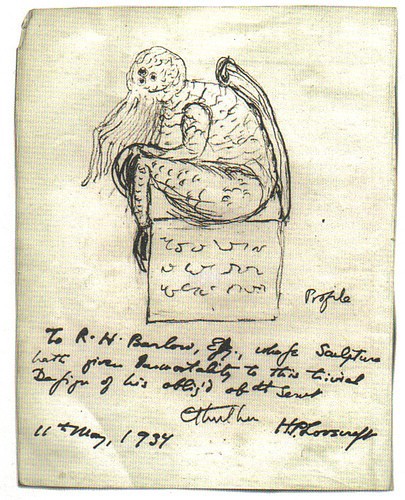 The only known drawing of Great Cthulhu by H.P. Lovecraft
The only known drawing of Great Cthulhu by H.P. Lovecraft
Lovecraft?s Writing Super Group
One of the interesting things has been how a circle of writers all borrowed each other?s names, places, and beings for their own work, creating in effect an ?open source universe? in the Mythos. They delighted in referencing each other?s works, interweaving their stories into the Mythos tapestry. From their many letters to each other it seems this was as more an act of creative fun than a conscious effort of create a mythic narrative setting.
Yet the myth-maker?s work includes some highly accomplished writers. Robert E. Howard ? who would become famous for creating Conan the Barbarian ? penned a number of Mythos stories. For example ?Worms of the Earth?, set during the Roman occupation of Britain, references the sunken city of R?lyeh. In return Lovecraft referenced a fictional forbidden tome Howard had created, Unaussprechlichen Kulten (also known as Nameless Cults) in his work. A young Robert Bloch ? who would go on to write the famous novel Psycho that Alfred Hitchcock would adapt into one of the most influential horror films of all time ? even appears as the character Robert Blake in Lovecraft?s short story The Haunter of the Dark. Lovecraft gleefully kills off the Bloch character, repaying some fun that Bloch had by adding a Lovecraft proxy to his tale The Shambler from the Stars.
They also referenced older works by authors they admired, such as Ambrose Bierce who created another fictional city ? Carcosa ? in 1886. Robert W. Chambers then reworked it into his 1895 highly influential collection of short stories, The King in Yellow, which Lovecraft and others then re-reference. Such examples are but a snapshot of how the Mythos is weaved into the works of a range of authors creating a mythic space that is greater than the sum of its parts.
I could go on, but if you want to explore Lovecraft and the work of his peers more, I strongly recommend subscribing to HPPodcraft, as they have some fascinating insight that goes into even further depth than I have here.!
H.P. Lovecraft
The Dreams of Cthulhu in Popular Culture
Wikipedia has a huge list of works inspired by the Cthulhu Mythos. In this article I?ll pick a few items to show the range of inspiration;
- South Park ? Has Justin Bieber destroyed by Cthulhu in one its most popular episodes.
- Bloodborne ? The critically acclaimed video game references the Mythos from its architecture, to the creatures within that architecture, to its narrative.
- The Illuminatus! Trilogy ? A trilogy that explores the idea of a global conspiracy. The trilogy references the Mythos many, many times and even has Lovecraft in it as a character.
- True Detective ? The HBO show?s first series is interwoven with references to the Mythos, most notably ?The King in Yellow?.
- Supernatural ? The long running TV show explores the themes of the Mythos and also adds Lovecraft as a character within the show.
- Hearthstone ? Mythos fans will instantly recognise many of the references in the Whispers Of The Old Gods update.
- The Call of Cthulhu Role Playing Game ? The critically acclaimed RPG is set within the Mythos worlds and has itself both popularised and expanded on the setting. Many fans discovered Lovecraft via the game, myself included.
The Attitudes of 1920s Towards the 2020s
It would be wrong to write of the Mythos and not to note its problematic side. As many of the seminal works were written in the early half of the 20th century it is sadly not surprising to find that many of its attitudes towards race, gender, and sexuality that we now find uncomfortable (to say the least!) are replete across much of the Mythos works. The debate on how to frame this today still rages.
What I find interesting is how those voices that were marginalised or derided back in the 1920s are now rising to the fore to reclaim and reinterpret the Mythos as it evolves ever-onwards. For example, in the excellent The Ballad of Black Tom, African-American author Victor LaValle gives a retort to the thinly-veiled racism in Lovecraft?s The Horror at Red Hook. In the brilliant The Dream-Quest of Vellitt Boe, author Kit Johnson re-works Lovecraft?s Unknown Cadith through the eyes of a female protagonist. In the recent meditation on Lovecraft?s work by the acclaimed comic book creator Alan Moore, Providence, he knowingly cast the central character as a gay man living in 1920s New York, which is both a reflection and a rejection of Lovecraft?s view on sexuality.
Why So Cthulhu?
So from a handful of pulp writers toiling away (mainly) in the 1920s and 30s on fringe publications, and often for little or no reward, to almost a hundred years later and a globally recognised cultural theme that undergoes constant reinvention, recombination, and recalibration, we have the Cthulhu Mythos today. Try a search on Twitter for Cthulhu for an example of how relevant the work still is today.
Why have the Cthulhu Mythos become such a huge cultural phenomena? My feeling as both a fan and a creator of Mythos materials is that it comes down to two main reasons;
- The ?open source? nature of the original Mythos means it was born within the concept of others adding their own take to it. This also mean that it comes with a sort of ?mashup-malleability? ? it can be eternally remixed.
- The core theme of the Mythos, that humanity is but a minor footnote in the history of Earth, speaks to us as part of our own fear and fascination with death and the concept of ?the apocalypse?.
Mythos Mashups
One of the reasons that the Mythos has been so prevalent and enduring is how well it can be mixed up with other narratives to create new spins on a story. There is a huge amount of new creations from this ?mashup? approach ? too many to mention them all ? but as they are a key part of Cthulhu appeal, it is worth exploring a few key ones here.
For example in Achtung! Cthulhu the setting has the occult-obsessed Nazis finding the remnants of the Mythos buried under the earth and setting about plundering them to merge with their inhuman science programs to create terrifying new weapons with which to win World War II. Like all good mashups this takes a kernel of reality and drops the ?what if? question into it. It is well documented how obsessed the Nazis were with occult knowledge and ancient sitesm so this mashup asks ?what if the occult was real? What if that occult was the Mythos?? and suddenly we?ve got the terrifying prospect that, in this fictional universe, all the resources the Nazis were pouring into esoteric research would pay dividends, but also that they are no longer the most terrifying being within the war ? they are making pacts with beings older than humanity and who seek humanity?s total doom. The desperate struggle of WWII now takes on an extra terrifying dimension as the Allies seek to uncover the true nature of the Nazis plans and attempt to stop them. What follows is a secret war within a war ? battling to destroy a secret Antarctic bunker or recover a forbidden tome from a hidden library in occupied Europe. Having been working within this mashup for a while, the connections are both fascinating and scary ? the perfect ingredients for a roleplaying game setting! It?s also cool that if you have to take on the creatures of the Mythos, you?d rather have some serious military grade firepower to do that with!
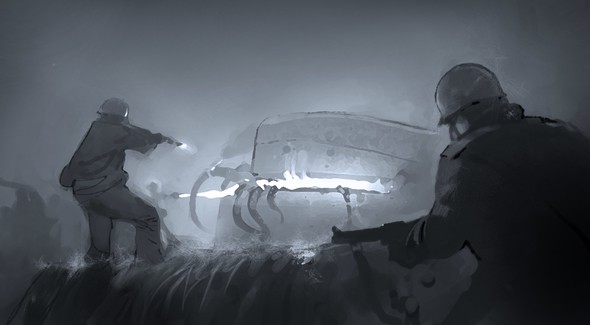 Artwork from Achtung! Cthulhu ? Modiphius Entertainment
Artwork from Achtung! Cthulhu ? Modiphius Entertainment
It?s worth noting a few other mashups too, as this is such a rich seam;
- What if the great Sherlock Holmes had to investigate the Mythos? That?s the premise of the collection of stories Shadows Over Baker Street, one of which (by Neil Gaiman), became a board game ? A Study in Emerald.
- What if the cold war powers discovered the secret buried Great Old Ones and tried to enlist them? Read the excellent A Colder War by Charles Stross for an exploration of this idea.
- From Tintin: A Cthulhu crossover right up to Cowboys, Romans, Dark Ages, Cyberpunk, and more, creators are wildly experimenting with the Mythos, and to often great effect.
We are but a Mote in Cthulhu?s Eye
Political philosopher John Gray?s book Straw Dogs makes the point that we humans have not really fully come to terms with what Darwin?s Theory of Evolution tells us ? that just as we as individuals are born to die, so too our species is born to die. Our own mortality is guaranteed, but so is that of our species, for what the fossil records show us is that the way things are is that species evolve from their ancestors, then die, perhaps leaving a descended species to take their place. Us humans, for all our clever tools and tech, are not that special ? we?ll go the way of the dinosaurs too. The only questions are ?how? and ?when?.
We are, undeniably fascinated with the apocalypse. As Quentin Cooper remarked;
?It is not easy to get our heads round the Earth having existed for billions of years, probably existing for millions if not billions more, and our own life in comparison ? however long and fruitful ? being an almost infinitesimally insignificant instant in the middle of it all. So fleeting and so far from either end of the story that many of us behave like individual black holes, mentally warping time to write ourselves into the grand finale.?
Thus he argues our fascination with the end times is about us trying to make sense of the enormity of it all and our tiny place within it.
The Cthulhu Mythos is this idea times ten! Not only will we and the world end, but the very forces that will do it are right now plotting it, and some people are even helping them! We could try to stop them, but that is little more than treading water before the waves drown us.
Yet what else can we do? There is no redeemer to save us, we are just motes in the eyes of titanic alien beings whose only interests in us are as fleeting as ours in a bothersome fly we are considering swatting. It?s a scary, yet beguiling thought, rendering humans as moths to Cthulhu?s flame. As Lovecraft himself wrote;
?The most merciful thing in the world, I think, is the inability of the human mind to correlate all its contents.?
